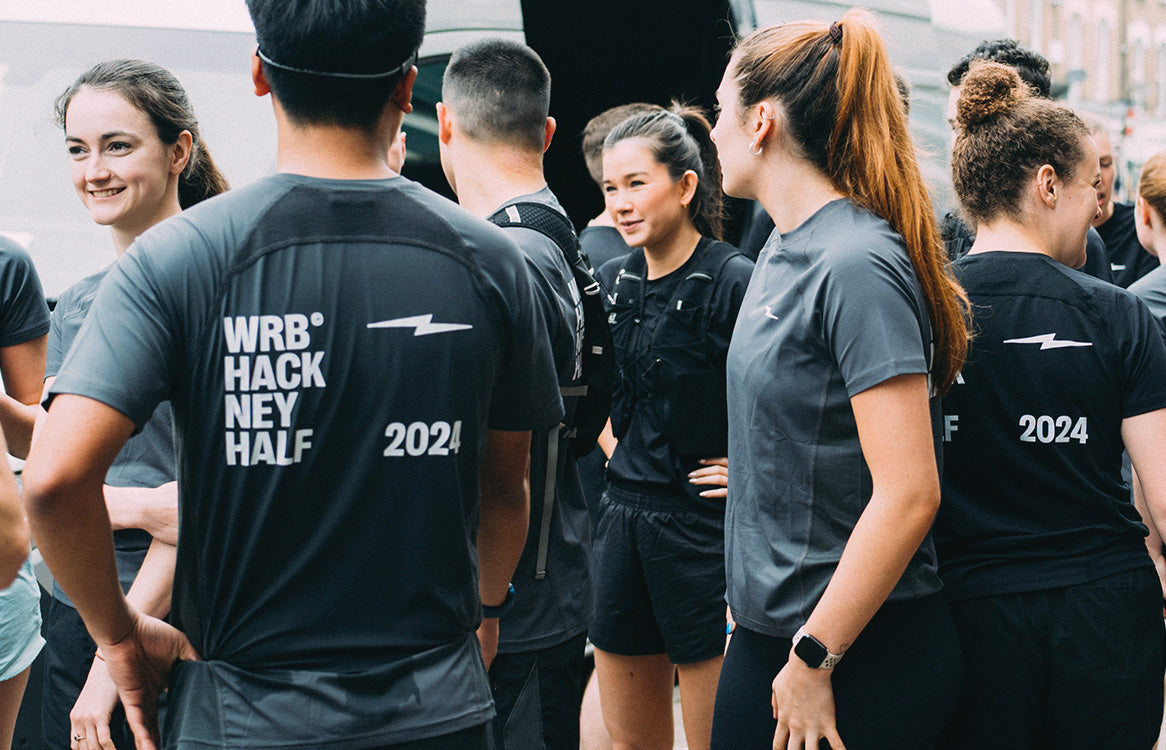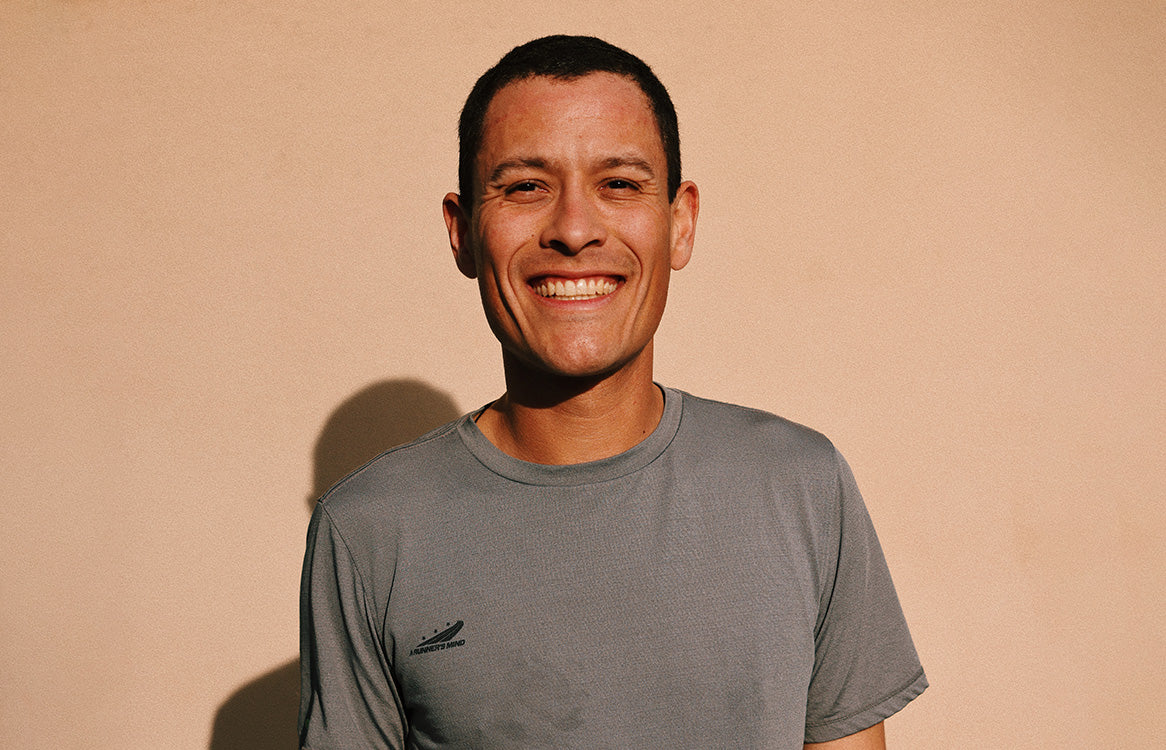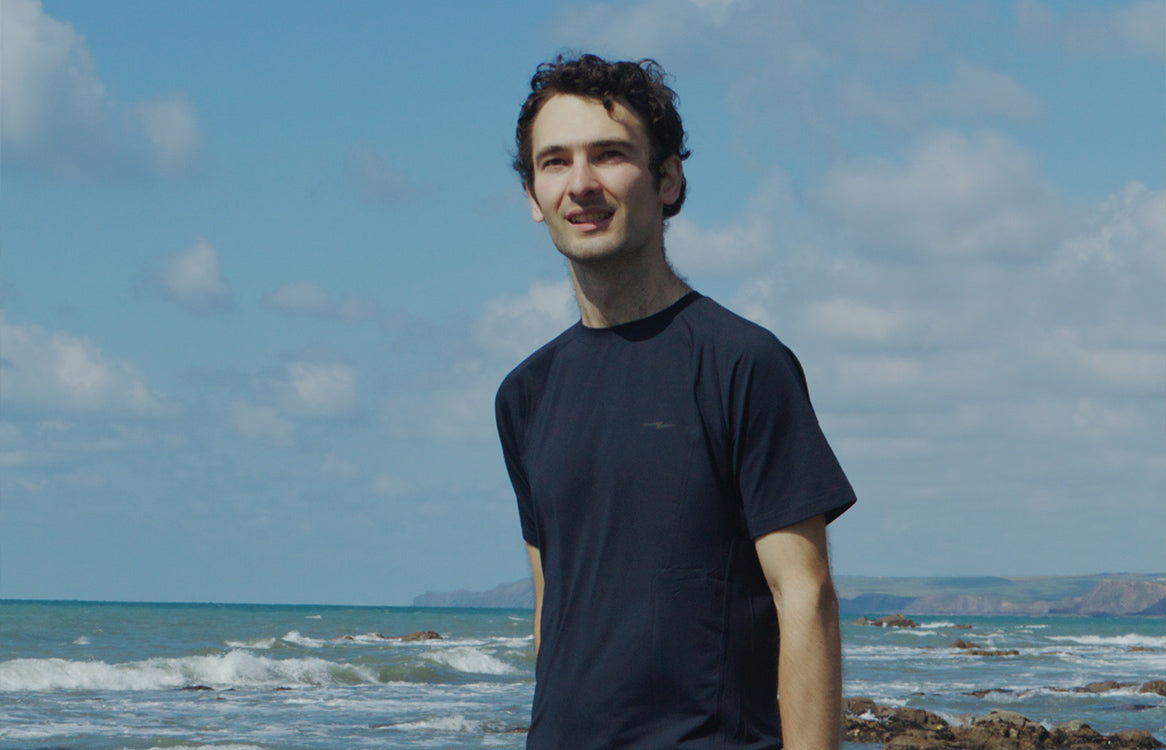If there is anyone who epitomises ‘running like the world depends on it’, it’s David Starley. One of the founding members of The Green Runners, a running community ‘making changes for a fitter planet’, David is a person whose need to run is intrinsically wrapped up with his urgent call to action to protect our imperilled natural world. Every footfall, for David, is also an opportunity to interrogate how we make better choices around the manner in which we can consume, move and live in a more equitable, sustainable manner.
We sat down over a video call to chat about the joy (and discomfort) of running but also the individual and collective action that we can take to tackle the climate crisis.
David is still looking a little weary when we speak in the run up to Christmas. He has been ill with Covid-19 and is not doing a lot of walking, let alone running. That does not mean, however, that he is averse to talking about the thing he loves so much, even if it feels a way off from him being able to actually do it again. It’s admirable since David is not someone built for indoor life; from an early age he was playing football and spending whole days outside with his friends. Even then, in play, endurance was emerging as a theme since, when the other children would be exhausted and turn for home, David would be the one shouting, “Come on! Just a bit longer!”
Running didn’t feature prominently until his first year at university when he found that there was less of the fitness training, which he had previously loved, built in around football practice. He started running by himself before joining a club, linked to the company where he had a placement, in 2018. At that point, it was primarily a way of meeting people and getting outside during lunch hours, rather than racing but that’s not to say that David isn’t concerned with speed.
“I’ve always been relatively quick, and I signed up to my first half marathon when my grandma passed away. I wanted to raise money for Alzheimer’s research because she died with Dementia and Alzheimer’s. I set myself a really ambitious goal, which at the time, I knew would be really hard. But I was also like, well, we might as well go for something hard and see what happens!”
The goal, for the first half-marathon, was one hour twenty-six minutes, which, aside from some generous calculations made from park run times, was because his grandmother would have been eight-six in the year that he ran the half marathon. When it came to the day, in less-than-ideal sub-zero conditions, and struggling from the midway point onwards, the clock stopped at one hour thirty minutes, “literally on the dot”. Although not the lofty time he had hoped to achieve, the half marathon set in motion what was to become a love affair with running, particularly when he discovered trails. Here, suddenly, was a way of combining two passions: Nature and moving efficiently through the landscape.

“I think it definitely took a while for me to really identify as a runner over anything else since I was still very multisport. It was moving down here in 2019 when running became my primary focus. At university, when I didn’t have much mental capacity for much else other than getting good marks, it was certainly a way of downloading stress; now, it’s both a way of getting headspace and consciously immersed in nature. I’m more emotionally mature now and notice how much more relaxed I feel after being out on the trails versus the middle of the road.”
The amount of time spent on those trails has gradually crept up and David has now completed several ultramarathons, as well as being the current holder of the Fastest Known Time for the Cornish Skyline, a seventeen mile, fell running route, taking in the highest points of Bodmin Moor. It’s been a fairly recent development, and David is characteristically modest about his abilities.
“The big changing point was in 2020. Prior to 2020, I didn’t really have much interest in even doing a marathon distance. Up until that year, I hadn’t gone more than 32km. I think the longest run I did then was for the Wings for Life World Run, when you run as far as you can before you get caught by the chaser car. I did a virtual version of it and felt horrible because you’re pushing the boundary of the furthest distance that you’ve ever run. So, by the end it wasn’t pretty and then then I had to walk all the way back up the hill to where I lived ...”
It was then that a work opportunity to visit Oman made him consider running as a vehicle to really explore new places. He had also seen that there was a 50km ultramarathon taking place whilst he was there and, out of curiosity to experience what pushing his limits would look like, signed up. The pandemic meant that the trip never happened but that didn’t dampen David’s ambitions to complete the distance. Instead, he ran his own 50km challenge along the Southwest Coast Path, an experience which pushed him from being ‘ultra-curious’ to actively seeking longer and longer distances.

“I did a 50-mile race in 2022 after some reflection at the end of the year that I could maybe go beyond the 50km mark. At this point, I was interested in the ultra-scene; The Green Runners had started, and I was seeing some people, like Damian Hall and Jasmin Paris, doing some pretty incredible things. Also, just normal people on social media who are doing these ultra marathons and are having to really go into that zone and find something within themselves to get past it. So, I thought: maybe I should see if I can do that”.
David ended up finishing seventeenth in the competitive Chiltern Wonderland 50-miler, run by Centurion Racing, and felt that there was still a lot left in the tank. Although he admits that he still hasn’t found his edge yet in terms of distance, tackling the Cornish Skyline was certainly a way of pushing that tank to empty with regards to speed.
“I really like the idea of just going out and testing myself on a route and the nearest one to me is the one on Bodmin Moor. It’s a really interesting route, 26km of fell running across all sorts of tricky terrain, starting at the Jamaica Inn; you have to touch the inn’s sign at the start and end, so it feels quite momentous.”
As well as being local to David, the route had a tantalising quick record to beat. Having run it in winter and coming within four minutes of the time, it was then a case of planning the lines he could pick to save time, keeping up the speed sessions and waiting for a favorable weather window to present itself for the actual attempt. That chance came, somewhat unexpectedly, on a dry summer weekend; he took it.
After two hours of challenging climbs and steep, boulder-littered descents, he could finally check his watch: he had beaten the record by two and a half minutes.
“I really did go into the pain box on that one; looking back, I couldn’t have pushed much more than that on that day, which I’m quite proud of. I think there’s only a couple of times where I’ve had that feeling. Any person that doesn’t run would just find it completely ridiculous, but the sheep must have such a fun time watching people hurtle themselves over these fells.”
As we consider the solitude that one can experience when totally immersed in the natural world, it seems a good point to pivot to discussing David’s environmentalism and the work that he is doing with The Green Runners. Although, he grew up with an awareness of climate related issues and was encouraged into good practices such as recycling and saving electricity as a child, it was again at university, in his final year, that David really became conscious of the crisis facing the planet.
It was 2018 and the IPCC report had shown just how catastrophic two degrees of global warming could be; XR protests had started in London and Greta Thunberg had hit the headlines.
Suffice to say it was the year when the voices calling for change were reaching a climax, and David was about to discover his. Approached to sit on a panel at the One Young World summit held on the Bath campus, he encountered the climate psychotherapist, Caroline Hickman and her work on eco-anxiety and climate psychology. David was struck by her call to channel emotions around the state of the world into speaking out, not shutting down, and, with this encouragement, vowed to work to advocate for climate consciousness as he started applying for jobs after graduation. When he finally landed a role in the central environment team at his current company, there really was no turning back: the planet and his relationship with it were embedded into the fabric of his life.
“Just as soon as you start opening yourself up to looking at the picture of climate change more and you start reading all the scientific papers, you can’t turn back. It becomes everything in your life. Everything you see, whether it’s a car or food, has this climate lens on it.”
This, for David, included running.
At the same time that he was starting to consider the environmental impacts of the sport, a group of runners was coming together to launch a campaign in conjunction with Cop26. David joined the WhatsApp group and was soon at the forefront of moulding, what is now known as, The Green Runners. The group has swelled to almost 1200 members globally, connecting people from across the world through the common practice of running and concern for the planet.
“The question we are asking is, can running be a conduit for calling for greater change? As sports have previously done on many occasions throughout history, exercising together brings people into a different frame of mind. There are definitely privileges in running and we should certainly acknowledge those as well, but in general, it’s something that anyone can do if they want to.”

The uniting ‘four pillars’ of the community are to encourage taking individual and collective action for how we move, ‘kit up’, eat and speak out, with members renewing their pledges on an annual basis. It’s a commitment that requires examining oneself, as well as the running industry, which can be an uncomfortable experience. The Green Runners, however, acknowledge that no one is perfect; it’s about making small changes that then set off a ripple effect of wider action.
It is also why recognising that tackling the wider systems that are in place that are causing the problem in the first place is becoming an increasingly important focus for the community, as well as the ongoing work to support members through sharing information and education, campaigning. As David puts it, they are becoming “impossible to ignore”.
One such example was the campaign around the car company, Dacia, sponsoring the biggest competitive mountain running series, UTMB. The situation is far from resolved but the CEO of UTMB met with The Green Runners and they were given a platform to speak about their concerns at the event and engage in debate. It’s the proactive nature of the group that makes David hopeful for future impact.
“In my work, it’s very purposeful and I love that, but it can be very slow to actually make any change happen. In contrast, whenever we jump on a call with the team in the Green Runners, it’s just always so positive. We’re doing all kinds of things and everyone’s on the same, well, not always on the same page exactly, but we all care and we’re all working towards the same thing.”
The online forum for the group is also alive with advice, experience and stories outside of exclusively climate related issues.
“It’s that ‘finding your tribe’ idea and acknowledging that people are multifaceted and that we’re doing this thing because we love running and we care about the environment. Those are things that connect us and are points of shared love, and there’s such a pool of interesting skills that go with it.”
There is clearly brilliant work being done, and I’m curious to hear what is David’s vision for the future of sustainability in the running industry.
“Ideally, in my lifetime, I’d like to see a world where we can run without, or at the very least a much smaller, environmental footprint. However, I’d also like to see people rediscovering the joy of local events. Unfortunately, we have this push towards world championships where people have to fly to different races just to qualify. Although it’s always amazing to see a new place in a new culture, we have to acknowledge that that’s simply not compatible with the climate crisis that we’re in, or in fact inclusive at all, because a lot of people won’t be able to afford to fly to these races.”
It’s a different story at David’s local fell race on Dartmoor where accessibility for all is very much at the heart of the event. It being a smaller community, he has found that you can really get to know the regular people competing, organising and supporting, making it as much a joyful celebration as a competition. The ‘back to basics’ setup is also another element of the changes David would like to see more widely adopted.

“We need to get away from the requirement to have stuff all the time. Why do you need a goodie bag from a race? Is that really why you’re there to do it? Isn’t it more for the fun of running, the landscape you’re running through, and the people that you’re with rather than some multivitamin tablets in a packet that you’re like never going to use or a plastic T-shirts, which, you know, you’re never going to wear.”
This stripping back to a sense of connection and purpose as to why we run and race in the first place extends to the increasing preoccupation within the community that faster is better. Whilst chasing times is by no means a bad thing, it has led to brands competing to shave milliseconds off PBs through unsustainable approaches to shoe design.
“I have enjoyed getting faster over time and that progression, but I think that times don’t mean very much anymore. If I run regularly and I happen to get a faster time, great, but it’s not the core purpose of why I’m here to do it. I think, in general, the industry would benefit from that outlook as well: if they embraced the wider perception of making a shoe that we actually enjoy running in; lasts us for a long time, and is affordable, rather than shoes that basically disintegrate over a marathon distance, it would be a far less selfish and less environmentally impactful production method.”
As David identifies, it’s a cultural and societal problem that also completely ignores the fact that, as with flying, there are many people who simply can’t afford to buy a shoe that will only last for one race and that the people who make the shoes are often woefully underpaid. It’s not just about the shoes, it’s about what we’re racing for and what we’re racing towards. Are we choosing compassion and humanity or are we choosing marginal, inequitable gains before all else. With that in mind, I ask David whether his reason for running has changed since his involvement with The Green Runners?
“The main reason I run is still for my sanity and nature. For me, the trails are where I can relax a bit because it’s so easy to just sort of get overwhelmed by everything and, if we’re being honest, it’s only going to get worse for at least five years. We’re going to have this constant tension between the interests of big oil, big agriculture and the climate changes we’re seeing, and they’re going to try to really fight to the bitter end. That’s not a pretty picture, unfortunately, so, we’re going to need these outlets and escape.”
It’s also a constant reminder for him of the immense privilege of being able to run at all.
“Those people in Tuvalu who are literally going to be underwater in a few years time, to use the title of Damian’s book, can’t run away from that. Once you acknowledge that, you realise that simply being able to go out and run and forget about things for a while is such a privilege.”
Read more

We recently visited our friends at We Run Belfast to learn more about how their run club is impacting the lives of runners all around Belfast.

Nick Kovaleski, a founding member of the Low Impact Alliance and operations manager for A Runner’s Mind – a run-focussed retail outlet in the Bay Area, California – talks to us about how authentici...

Leave a comment
All comments are moderated before being published.
This site is protected by hCaptcha and the hCaptcha Privacy Policy and Terms of Service apply.